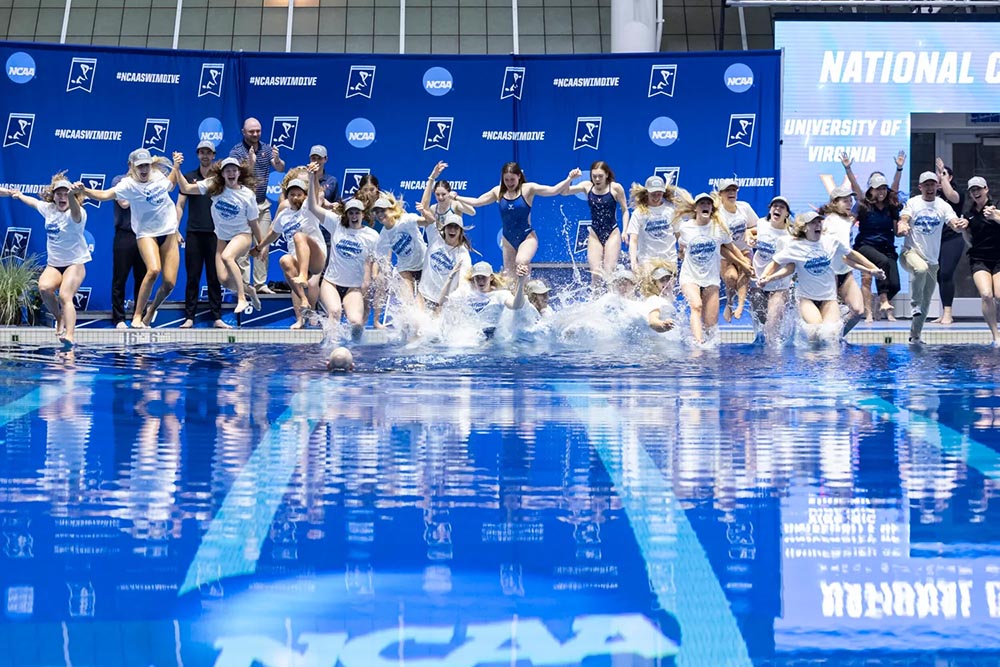Four in a row: Women’s swim wins NCAAs, again

ATHENS, GA—While most Virginia fans spent another March quietly contemplating a more prominent sport’s if-onlys, those here inside the Gabrielsen Natatorium could barely hear themselves think. Never mind the smartwatch decibel alerts, they brought the noise as the UVA women’s swimming and diving team brought home its fourth-consecutive NCAA championship.
The Cavaliers now rank fifth in national titles among the country’s 200 Division 1 women’s swimming programs. In the division’s 42-year history, only two have won five in a row, a UVA goal for next year.
Todd DeSorbo, who runs both the women’s and men’s programs, led UVA to its first swimming title in 2021, his fourth season as a head coach anywhere, and neither he nor the women have stopped since. He’s tied for fourth on the all-time list of Division 1 champion women’s swim coaches.
And the swimming has been world-class. In June, UVA swimmers, women and men, will swarm the U.S. Olympic Trials. DeSorbo himself has already made the cut, selected to head the USA women’s team in Paris this summer.
‘The best NC2A performance we’ve ever seen’
Third-year Gretchen Walsh (Com ’25) will likely join him there. At the meet here, she had what one commentator has called the best NCAA performance of any swimmer, male or female, of the past 24 years. She broke her own NCAA records in each of her three individual events and, for the second consecutive year, helped UVA set a new NCAA record in the 400 medley relay.

With the heat’s slowest start off the blocks, not unusual for her, and surfacing from her underwater kick precisely at the regulatory limit, her trademark, she set a fourth NCAA record in as many weeks in the 50-yard freestyle, shaving it to 20.37 seconds.
Her 44.83 in the 100 free similarly broke the record she had set at the Atlantic Coast Conference championship in February.
There she also set the NCAA record in the 100 butterfly despite, as she insisted afterward, having mistimed the wall touches on her turns. She fixed that in Athens, with a beautifully executed 47.42 finish, a nearly one-second improvement.
“Gretchen swam the best NC2A performance we’ve ever seen,” said SwimSwam.com podcast host Coleman Hodges, who devoted an episode to comparing Walsh with other college greats.
“She pushed sprint boundaries past the point that we really thought were possible,” he said. “I think people are going to be chasing these records for years and years to come, and she helped her team win four relay titles and a team title.”
Alex Walsh (Col ’24), Gretchen’s sister, delivered a similar performance. She too won each of her three individual events—the 200 and 400 individual medleys and 200 breaststroke. Each was a personal best. In both 200-yard events she finished just a fraction of a second off the NCAA records her training partner and former teammate Kate Douglass (Col ’23, Grad ’28) set last year.
Jasmine Nocentini (Com ’24), a transfer from Northwestern University, pulled off an upset victory in the 100 breaststroke with a personal best 56.09 seconds in a field that included the University of Texas’ Lydia Jacoby, the 2021 Olympic gold medalist in the 100-meter breast.
Together the Walsh sisters and Nocentini swam crucial legs on UVA’s four winning relays. The three accounted for 288.5 (55 percent) of UVA’s total 527.5 points, besting Texas, which dogged the Cavaliers until the final day of competition.
A show of the team’s depth, 14 athletes contributed points to UVA’s total, including fourth-year freestyler Maxine Parker (Col ’24) (52.5 points), a transfer from the University of Georgia; graduate student breaststroker Ella Nelson (Educ ’23, Com ’24) (48.5 points) and—for the first time at the women’s NCAAs for UVA—a diver, third-year Elizabeth Kaye (Col ’25) (18 points).
Tears and triumph
For all the scoring, the ’Hoos faced challenges. On the first night of competition the UVA women, who hadn’t lost a relay in two years, came in fourth in the 800 free relay. They ended the day behind the University of Florida in cumulative points.
Virginia took the lead on Day 2 but also watched Texas make its charge. On Day 3, the Longhorns outscored the Cavaliers in daily points to close in.
Then, during the preliminary heats on the morning of Day 4, Virginia sealed the meet when five of its swimmers qualified for the finals in the 200 breaststroke and two for the 200 fly. Even if they all were to come in last that evening (which none did), they would earn enough points to make a Texas win mathematically impossible.

“It’s the first time I’ve ever cried at a national championship,” DeSorbo told the Virginia fans later. “I cried after the 200 breaststroke this morning in prelims and after the 200 butterfly this morning in prelims. That was the most badass NCAA prelims session I’ve ever been a part of.”
For the final evening of the meet, there were plenty more tears to go around, especially among those in their final year of collegiate eligibility. In between hugs and selfies with teammates and coaches, the UVA swimmers didn’t let up. That included the last event, a breathtaking 400 freestyle relay, featuring Nocentini, Alex Walsh, Gretchen Walsh and Parker. They finished almost two body lengths ahead of the pack in 3:30.89, just 0.05 shy of the record, which, you might have guessed, UVA set last year—when it beat its own NCAA record from the year before.